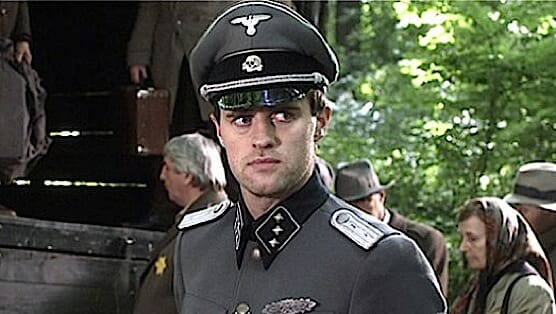
War is a terrible thing, full of horrors big and small. And yet in the swirling darkness, amidst all the depravity and moral compromise, slivers of light often emerge, offering compelling case studies in human character and resilience. That truism is again borne out in Walking With the Enemy, an unfussy but robust World War II drama inspired by the factual story of a small-town Hungarian rabbi’s son who used wile, guile and occasionally brute force to disrupt Nazi occupation and save countless Jewish friends and families.
Regent Horthy (Ben Kingsley), the leader of Hungary and a onetime German ally, has fallen out of favor with Berlin over his refusal to fully prosecute their Final Solution. As he attempts to stall and open back-channel negotiations to Allied powers, the clock runs out and his grip over government apparatus is wrested from him.
Meanwhile, separated from his family during forced relocations, Elek Cohen (Jonas Armstrong) escapes and reconnects with Hannah Schoen (Hannah Tointon), a young girl whom he met at a dancehall some months earlier. With the help of Hannah’s uncle, Miklos (Simon Dutton), Elek starts forging Swiss citizenship documents. When a colleague is pinched by the Nazis, however, matters escalate further. Using some stolen German officer uniforms, Elek and others, including his former boss, Jozsef Greenberg (Simon Kunz), pose as SS Guards to go in and save their friend, as well as retrieve their valuable counterfeit passports. So begins a dangerous parallel campaign of gamesmanship, with Elek and others trying to extricate as many Jews as they can from under the noses of the German army.
The directorial debut of Mark Schmidt, the CEO of distributor Liberty Studios, Walking With the Enemy has just enough scale to give its narrative roots. Its characterizations are crisp and clear, and there’s an appreciable sturdiness to its screenplay, by Kenny Golde. It has dramatic incidents aplenty, which give it girders. But it also elicits plenty of rich, corresponding thought and feeling by way of glancingly showcasing the cracks in the Nazi propaganda machine (falsified postcards from those sent away to concentration camps), and the way that misinformation and especially the lack of concrete information slowly seeds doubt, worry and, eventually, action.
Kingsley is obviously the name draw here, and his grave presence provides the movie with an emotional anchor, but his is a supporting role. Armstrong is Walking With the Enemy’s moral force, and he gives Schmidt’s film a forward-leaning energy; he’s the character that a viewer questions whether he or she would have the guts to be. It’s a performance rooted in righteousness, but Armstrong also taps into the inner conflict of a swallowed power dynamic—he locates both the lust and queasiness of playing a Gestapo officer, and having to own that guise, and all the action it entails, at inopportune times and at a moment’s notice.
If its story tracks familiarly alongside that of other, similar World War II tales put to screen before—and many with more resources—Walking With the Enemy still shrewdly and engagingly spotlights the calculus of ethical incursion—of risking one life to save potentially thousands, as well as risking potentially thousands to save one.
Brent Simon is a regular contributor to Screen Daily, Paste, Playboy, Magill’s Cinema Annual and ShockYa, among many other outlets, as well as a member and former three-term president of the Los Angeles Film Critics Association. You can follow him on Twitter and on his blog.
Director: Mark Schmidt
Writer: Kenny Golde
Starring: Jonas Armstrong, Simon Kunz, Ben Kingsley, Hannah Tointon, Simon Dutton, Charles Hubbell, Burn Gorman
Release Date: Apr. 25, 2014